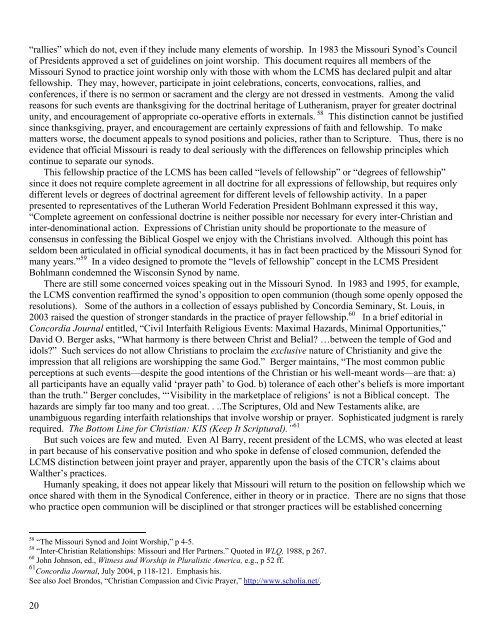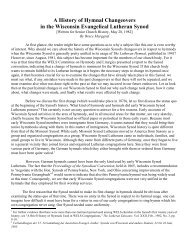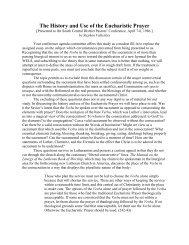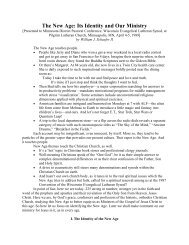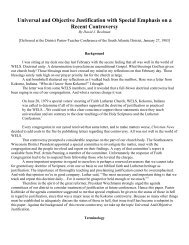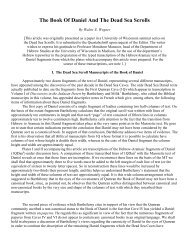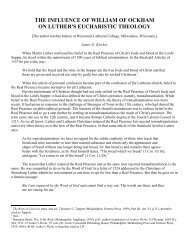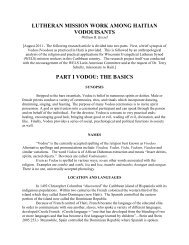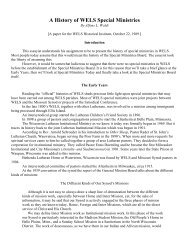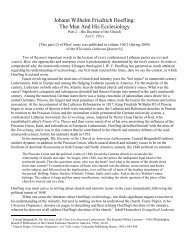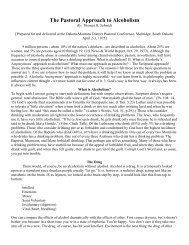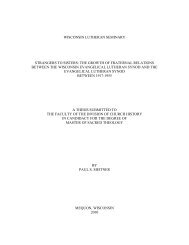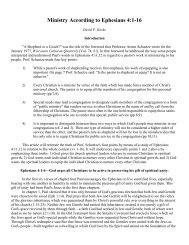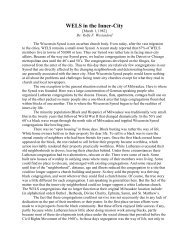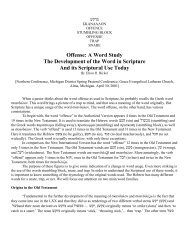The Synodical Conference and Prayer Fellowship - Wisconsin ...
The Synodical Conference and Prayer Fellowship - Wisconsin ...
The Synodical Conference and Prayer Fellowship - Wisconsin ...
You also want an ePaper? Increase the reach of your titles
YUMPU automatically turns print PDFs into web optimized ePapers that Google loves.
“rallies” which do not, even if they include many elements of worship. In 1983 the Missouri Synod’s Council<br />
of Presidents approved a set of guidelines on joint worship. This document requires all members of the<br />
Missouri Synod to practice joint worship only with those with whom the LCMS has declared pulpit <strong>and</strong> altar<br />
fellowship. <strong>The</strong>y may, however, participate in joint celebrations, concerts, convocations, rallies, <strong>and</strong><br />
conferences, if there is no sermon or sacrament <strong>and</strong> the clergy are not dressed in vestments. Among the valid<br />
reasons for such events are thanksgiving for the doctrinal heritage of Lutheranism, prayer for greater doctrinal<br />
unity, <strong>and</strong> encouragement of appropriate co-operative efforts in externals. 58 This distinction cannot be justified<br />
since thanksgiving, prayer, <strong>and</strong> encouragement are certainly expressions of faith <strong>and</strong> fellowship. To make<br />
matters worse, the document appeals to synod positions <strong>and</strong> policies, rather than to Scripture. Thus, there is no<br />
evidence that official Missouri is ready to deal seriously with the differences on fellowship principles which<br />
continue to separate our synods.<br />
This fellowship practice of the LCMS has been called “levels of fellowship” or “degrees of fellowship”<br />
since it does not require complete agreement in all doctrine for all expressions of fellowship, but requires only<br />
different levels or degrees of doctrinal agreement for different levels of fellowship activity. In a paper<br />
presented to representatives of the Lutheran World Federation President Bohlmann expressed it this way,<br />
“Complete agreement on confessional doctrine is neither possible nor necessary for every inter-Christian <strong>and</strong><br />
inter-denominational action. Expressions of Christian unity should be proportionate to the measure of<br />
consensus in confessing the Biblical Gospel we enjoy with the Christians involved. Although this point has<br />
seldom been articulated in official synodical documents, it has in fact been practiced by the Missouri Synod for<br />
many years.” 59 In a video designed to promote the “levels of fellowship” concept in the LCMS President<br />
Bohlmann condemned the <strong>Wisconsin</strong> Synod by name.<br />
<strong>The</strong>re are still some concerned voices speaking out in the Missouri Synod. In 1983 <strong>and</strong> 1995, for example,<br />
the LCMS convention reaffirmed the synod’s opposition to open communion (though some openly opposed the<br />
resolutions). Some of the authors in a collection of essays published by Concordia Seminary, St. Louis, in<br />
2003 raised the question of stronger st<strong>and</strong>ards in the practice of prayer fellowship. 60 In a brief editorial in<br />
Concordia Journal entitled, “Civil Interfaith Religious Events: Maximal Hazards, Minimal Opportunities,”<br />
David O. Berger asks, “What harmony is there between Christ <strong>and</strong> Belial? …between the temple of God <strong>and</strong><br />
idols?” Such services do not allow Christians to proclaim the exclusive nature of Christianity <strong>and</strong> give the<br />
impression that all religions are worshipping the same God.” Berger maintains, “<strong>The</strong> most common public<br />
perceptions at such events—despite the good intentions of the Christian or his well-meant words—are that: a)<br />
all participants have an equally valid ‘prayer path’ to God. b) tolerance of each other’s beliefs is more important<br />
than the truth.” Berger concludes, “‘Visibility in the marketplace of religions’ is not a Biblical concept. <strong>The</strong><br />
hazards are simply far too many <strong>and</strong> too great. . ..<strong>The</strong> Scriptures, Old <strong>and</strong> New Testaments alike, are<br />
unambiguous regarding interfaith relationships that involve worship or prayer. Sophisticated judgment is rarely<br />
required. <strong>The</strong> Bottom Line for Christian: KIS (Keep It Scriptural).” 61<br />
But such voices are few <strong>and</strong> muted. Even Al Barry, recent president of the LCMS, who was elected at least<br />
in part because of his conservative position <strong>and</strong> who spoke in defense of closed communion, defended the<br />
LCMS distinction between joint prayer <strong>and</strong> prayer, apparently upon the basis of the CTCR’s claims about<br />
Walther’s practices.<br />
Humanly speaking, it does not appear likely that Missouri will return to the position on fellowship which we<br />
once shared with them in the <strong>Synodical</strong> <strong>Conference</strong>, either in theory or in practice. <strong>The</strong>re are no signs that those<br />
who practice open communion will be disciplined or that stronger practices will be established concerning<br />
58<br />
“<strong>The</strong> Missouri Synod <strong>and</strong> Joint Worship,” p 4-5.<br />
59<br />
“Inter-Christian Relationships: Missouri <strong>and</strong> Her Partners.” Quoted in WLQ, 1988, p 267.<br />
60<br />
John Johnson, ed., Witness <strong>and</strong> Worship in Pluralistic America, e.g., p 52 ff.<br />
61<br />
Concordia Journal, July 2004, p 118-121. Emphasis his.<br />
See also Joel Brondos, “Christian Compassion <strong>and</strong> Civic <strong>Prayer</strong>,” http://www.scholia.net/.<br />
20


